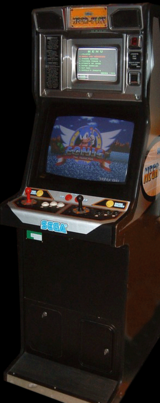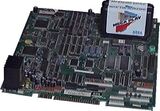Difference between revisions of "Mega Play"
From Sega Retro
old>MathUser |
old>MathUser |
||
| Line 1: | Line 1: | ||
[[Image:Megaplay2.png|thumb|right|160px|Sega MegaPlay arcade machine.]] | [[Image:Megaplay2.png|thumb|right|160px|Sega MegaPlay arcade machine.]] | ||
| − | The '''MegaPlay''' is an arcade | + | The '''MegaPlay''' is an arcade cabinet, created alongside [[Sega]]'s then-new [[Sega Mega Drive/Genesis]] hardware. The unit was developed in Japan, and hit coin-op arcades worldwide in 1989. |
| − | The concept behind the machine was similar to | + | The concept behind the machine was similar to the Nintendo PlayChoice 10 which was also available at that time. |
| − | There are two known standard versions of the unit. The first contained ''Thunder Force 2'', ''Altered Beast'', ''Tetris'', ''Last Battle'', ''Space Harrier 2'', and ''[[Golden Axe]]''; the second added ''[[Sonic the Hedgehog (arcade game)|Sonic the Hedgehog]]'' to this selection. Eventually ''[[Sonic the Hedgehog 2 (arcade game)|Sonic the Hedgehog 2]]'' became available also. However, the unit could also be configured however the vendor desired - the internals consisted of a uncased Genesis PCB, a 10-slot multi-cart adapter, two built-in | + | There are two known standard versions of the unit. The first contained ''Thunder Force 2'', ''Altered Beast'', ''Tetris'', ''Last Battle'', ''Space Harrier 2'', and ''[[Golden Axe]]''; the second added ''[[Sonic the Hedgehog (arcade game)|Sonic the Hedgehog]]'' to this selection. Eventually ''[[Sonic the Hedgehog 2 (arcade game)|Sonic the Hedgehog 2]]'' became available also. However, the unit could also be configured however the vendor desired - the internals consisted of a uncased Genesis PCB, a 10-slot multi-cart adapter, two built-in joysticks, and the appropriate coin-op and cart-switching hardware. This meant that, in theory, any title created for the Genesis hardware could be used in the MegaPlay unit, and vice versa. However, MegaPlay cartridges differed from standard Genesis cartridges in that they contained various encryption techniques and BIOS chips, to prevent unscrupulous arcade owners simply swapping in the cheaper retail cartridges. The cartridges were also shaped like standard Japanese Mega Drive cartridges, to prevent the games fitting into American and European home systems. It should also be noted that as the internal components of the games and hardware were no different from the home units and games, that all of the Genesis cheats for these titles also worked with their MegaPlay "arcade" versions. |
[[Image:megaplay.jpg|thumb|left|160px|Sega MegaPlay hardware.]] | [[Image:megaplay.jpg|thumb|left|160px|Sega MegaPlay hardware.]] | ||
Revision as of 09:23, 19 February 2009
The MegaPlay is an arcade cabinet, created alongside Sega's then-new Sega Mega Drive/Genesis hardware. The unit was developed in Japan, and hit coin-op arcades worldwide in 1989.
The concept behind the machine was similar to the Nintendo PlayChoice 10 which was also available at that time.
There are two known standard versions of the unit. The first contained Thunder Force 2, Altered Beast, Tetris, Last Battle, Space Harrier 2, and Golden Axe; the second added Sonic the Hedgehog to this selection. Eventually Sonic the Hedgehog 2 became available also. However, the unit could also be configured however the vendor desired - the internals consisted of a uncased Genesis PCB, a 10-slot multi-cart adapter, two built-in joysticks, and the appropriate coin-op and cart-switching hardware. This meant that, in theory, any title created for the Genesis hardware could be used in the MegaPlay unit, and vice versa. However, MegaPlay cartridges differed from standard Genesis cartridges in that they contained various encryption techniques and BIOS chips, to prevent unscrupulous arcade owners simply swapping in the cheaper retail cartridges. The cartridges were also shaped like standard Japanese Mega Drive cartridges, to prevent the games fitting into American and European home systems. It should also be noted that as the internal components of the games and hardware were no different from the home units and games, that all of the Genesis cheats for these titles also worked with their MegaPlay "arcade" versions.
The cabinet had two screens: a large gameplay screen, and a smaller instruction screen, located just above the main gameplay screen. Gameplay was timed via built-in hardware (the length of which could be set by the arcade owner using dipswitches inside the coin box). When you ran out of time, the gameplay screen would flash green and controller input would not be accepted, leaving the game unplayable until more credits were inserted.
The multicart adaptor used in the MegaPlay was later adapted and sold as an accessory for the home console - the 'Video Jukebox', which plugged into the console's cartridge slot.
Flyer scans


